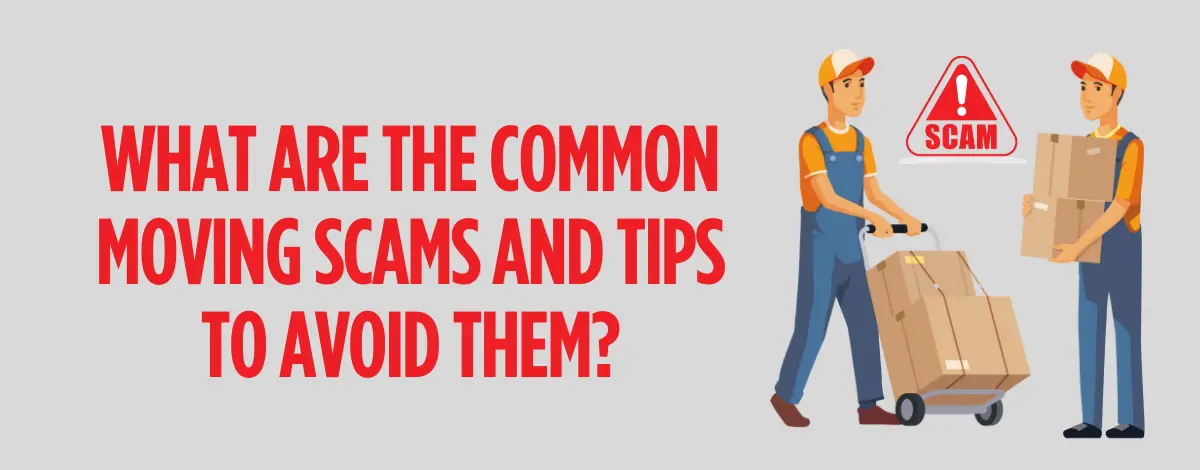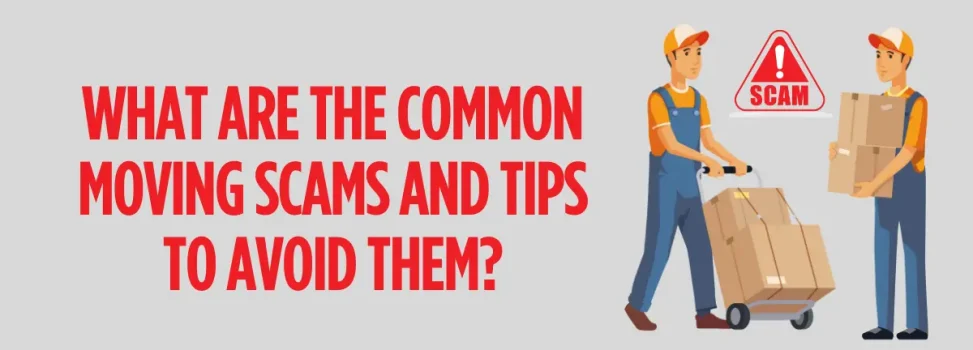Anybody wishing to move to a new house or place of business may find moving scams to be an awful experience. Sadly, there are dishonest moving firms out there that take advantage of gullible clients. They employ various strategies to overcharge, harm, or even pilfer their property. This time, we’ll help you and go over the most typical moving scams and how to stay away from them.
1. Moving scam: Cheap Approximations:
A fraud of the first kind occurs when your removalist agency quotes you an incredibly low fee for packing and transporting your stuff.
The moving firm will con you in this case, receive your initial payment, and then vanish.
Tips to avoid:
You want to examine two or three various moving firms in addition to the charging to prevent falling victim to such a fraud. After that, you should check a typical market price for movers and get an approximate figure from these businesses. If the pricing appropriately reflects the market rate, you can tell who is legitimate and prevent yourself from falling victim to fraud.
2. Moving scam: Without estimate:
You may also run the risk of your movers refusing to deliver you an estimated quote in addition to the low-balled assessment fraud. They won’t physically examine your items; instead, they will only do the deal over the phone.
This is a serious fraud since reliable moving firms constantly offer an estimated cost after taking into account the type of relocation, the weight of your possessions, and the access. If they refuse to give you an estimate, it indicates that they will impose exorbitant fees on you once your move is completed.
Tips to avoid:
To determine how much stuff you possess, you need to inspect your apartment with your moving company to get an approximate quote. If they decline, you should look for other trustworthy moving firms and refrain from employing them.
3. Moving scam: Untrue Permits:
It can be a fraud if you ask your moving business for the permit, and they provide you with a piece of paper that doesn’t seem real. These businesses also make phony websites and offer phony sources.
Tips to avoid:
By being aware of who you have to cope with and having a lawyer check their permit, you may safeguard yourself against con artists. To find out if there have been any mentions or reviews of the removalist service, you must also do a thorough investigation and visit other websites. In these situations, it is preferable to work with packers whose permits are valid and who have been suggested by relatives and close companions.
4. Moving scam: Undefined Contract:
It is a scam if after narrowing down your options, the removalist company asks you to agree to an undefined contract. This indicates that they can get your approval on the contract and fill in any information that could lead to you having to pay a lot of money when the relocation is finally completed.
Tips to avoid:
Having everything down on paper is the best approach to stay out of this predicament. At that point, all the information and the estimated price have been completed, and you are certain of what is possible after your relocation, you finalize a moving deal.
5. Moving scam: Additional Charges:
Sometimes moving companies may attempt to purposefully omit specific services from your agreement. After the process of moving, they will provide these services for an additional fee. As a result, you will have to pay these extra costs.
Tips to avoid:
When a removalist firm offers full services and includes them in their initial price, it’s an indication of quality. To ensure that you understand what you can anticipate, you must choose a legally binding contract that includes all expenses and services.
6. Moving scam: Excessive Deposits:
It can be a scam when your removalist firm requests sizable deposits upfront. Usually, after accepting the deposit, these dishonest businesses disappear.
Tips to avoid:
By merely paying 25% of your anticipated price, you should be able to prevent this. It is advisable to steer clear of a firm that requests a large deposit from you.
7. Moving scam: Storing your possessions:
A common moving scam is the “hostage setting,” in which movers agree to hold your belongings in exchange for a hefty fee. You’ll pay the price they ask for your things because you need them back.
Tips to avoid:
Investigating the moving company you are considering employing in-depth is the greatest method to stay away from this fraud. When you choose a reputable removalist business, go online, examine independent websites, and get in touch with previous customers to hear their opinions.
8. Moving scam: Under-qualified Workers:
In this fraud, an agreement will be given to you by your moving firm, and after the transaction is completed, it will be assigned to a third party. These movers may use unqualified laborers and resources to complete your relocation, which may result in a subpar level of service.
Tips to avoid:
You must have a prior conversation with your movers to find out if they employ subcontractors or regular staff. To prevent suffering from this fraudulent activity, you could also inquire with previous customers about the same.
9. Moving scam: Coverage from insurance:
Finally, it is a scam if your moving provider does not provide insurance coverage. The majority of trustworthy moving firms will provide you with either complete security, covering the whole cost of your belongings, or partial security, covering only a portion of that sum. If you use these services, you run the risk of suffering significant losses if your belongings are damaged during transit.
Tips to avoid:
Asking prospective movers about their insurance coverage will help you avoid shady companies. This will save you much money on item recovery or repair costs.
FAQs about Moving Scams and Tips to Avoid Them:
Cheap approximations, without estimation moving process, untrue permit, undefined contract, additional charges, excessive deposit, hostage setting, hiring under qualified workers, etc are the common moving scams.
You should check a typical market price for movers and get an approximate figure from these businesses. If the pricing appropriately reflects the market rate, you can tell who is legitimate and prevent yourself from falling victim to fraud.
You can verify the legitimacy of the permit with the help of a lawyer. You may safeguard yourself against con artists. In order to find out if there have been any mentions or reviews of the removalist service, you must also do a thorough investigation and visit other websites.
When a removalist firm offers full services and includes them in their initial price, it’s an indication of quality. To ensure that you understand what you can anticipate, you must choose a legally binding contract that includes all expenses and services. Through this way, you can avoid falling victim to additional charges after moving.
Movers agree to hold your belongings in exchange for a hefty fee. You’ll pay the price they ask for your things because you need them back.
Yes, it is essential for a moving company to provide insurance coverage in order to give security to the customers’ belongings.


